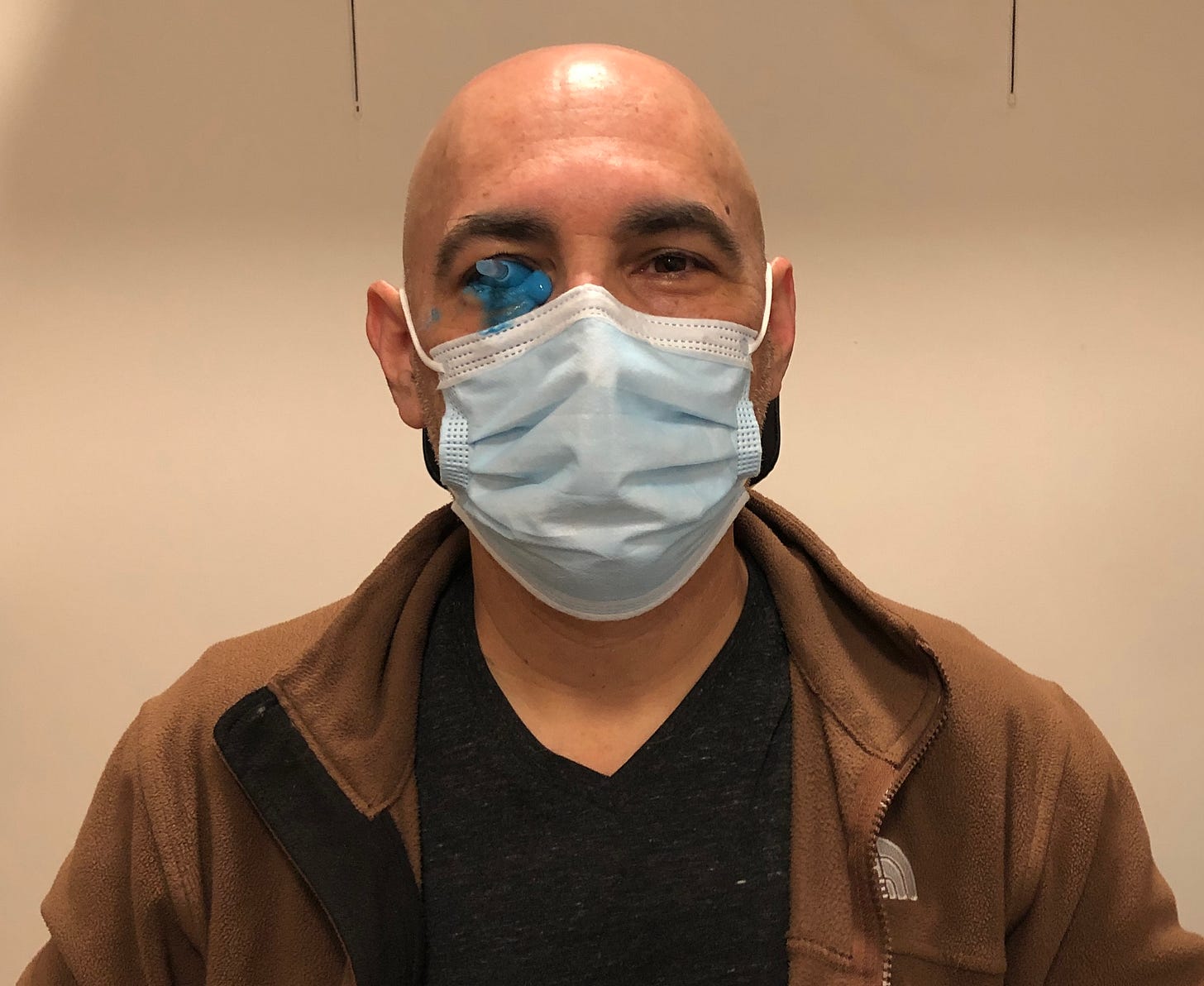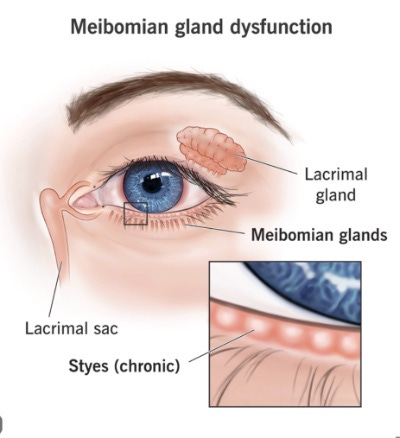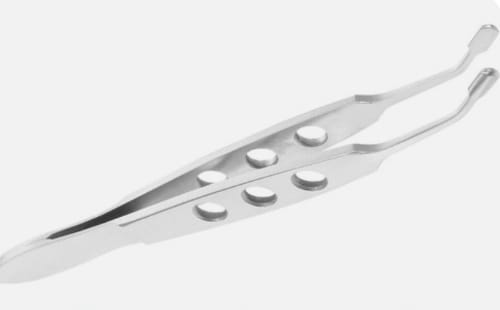Doctor, My Eyes
How a Jackson Browne earworm led me to deal with a particularly annoying eyeworm
Eye Before E Except After See
Last week, I received a letter in the mail from my health insurance provider stating that they will no longer pay for the eye drops I use for my meibomian gland dysfunction and dry eyes. An alternative medication was suggested, one that I’ve tried before and does not work.
For more than five years, I have tested a dozen different eye drops, ointments, and gels, none of which have given me any relief.
Meibomian gland dysfunction is a condition where the meibomian glands (found just inside our upper and lower eyelids) don’t produce enough oils. And the oil that does exist is usually thick and unable to soften enough to keep the eye lubricated, leading to dry eye and persistent, chronic styes.
There are various treatments one can try for this, but I won’t bore you with most of them. The most common suggestion is to soak your eyelids with a warm compress or a microwavable eye mask. This, in theory, should soften the oils, allowing you to express them and release the previously pasty gland goo (say that five times fast). Want to see how it’s done? Here’s the instructional video I was shown at the UC Berkeley Eye Center.
I was told to do this three times a day to evaluate its effectiveness. Doing this even twice a day was a serious chore, as the process takes around 20 minutes and I have TV shows to watch and Substack essays to write. However, I persisted, steaming my glands beneath a microwavable eye-bra twice a day for several months.
Sadly, I was never able to express much oil from my lids, no matter how soft and supple I got them. My lids are preternaturally tight, and my fingers short and stubby, so grabbing a narrow segment of my lid, as shown in the image above, is not possible with my genetic makeup. There are devices available designed to do the squeezing for you (image below), which I tried, but almost poked my eye out.
In addition to chronic styes and dry eye, I would often wake up in the morning with my eyes “glued” shut. I hypothesized that the oils I had been expressing (not very effectively) decided to sneak out in the middle of the night and comingle their thick, creamy juices. By morning, my lids would be coated in a crusty paste. I could extract some of it by rubbing with my finger, just enough to stumble to the bathroom where I would soak a Q-Tip with saline and carefully remove the rest of the gunk until I could blink without my lashes clashing.
Then, about a year ago, I read about Miebo, a new prescription medication eyedrop that was receiving glowing reviews. I asked my ophthalmologist about it, and he told me he’d heard of it, but didn’t know its efficacy. Thankfully, he agreed to write up a prescription for it anyway. As a specialty medication, I worried that the pharmaceutical and insurance bureaucracy would make acquiring this medication akin to stealing a rare diamond stored at the center of a drug cartel’s compound. And if I am somehow able to do that, I’d have to use said rare diamond to pay for the eye drops.
The next day, I received a text that I should receive Miebo in the mail within two weeks. It arrived five days later.
The fact that the makers of Perfluorohexyloctane Ophthalmic Solution (I do particularly love this acronym) decided to stick to the rule of “I before E except after C” and reverse the grammatically dubious spelling of Meibomian for their product was a good omen for a word stickler like me.
Within a week of using the new drops, I could feel the health of my eyes markedly improve. It’s hard to explain how, but the burning, tired, parched feeling that would come after 30 minutes in front of the computer or the TV was gone.
My eyes simply felt less dry. To me, it was a miracle drug. Miebo had become ‘my beau.’
I should sell this amazing pun to their advertising department.
Unfortunately, though, like the saying goes, all good things must come to an end.
When I received this letter, I will admit that visions of Luigi Mangione flashed in my head. Not that I harbored legit murderous intentions — let me get that out of the way — but as a creative person, I understand the importance of dramatic flourishes in effective storytelling.
I find it the epitome of dishonest corporate bullshittery that the pharmacy benefits administrator claims to be using their “experience and expertise” to improve my safety and lower the overall costs to me.
As far as I’m aware, the small bottle of Miebo I’d been receiving each month for a year has never tried to glue my eyelids shut in the middle of the night. Nor has it attempted to burn my retinas in its chemical bath. In terms of overall costs, I had been paying exactly ZERO DOLLARS for the medication, for which I have been enormously grateful, and for which I would be willing to pay 20 or 30 dollars (or more) for.
The billable charges that doctors and pharmacies list for many medications are beyond exorbitant. I imagine that the inflated prices are specific to insurance payouts, a game of industry cat and mouse, with patients like you and me (I’m including you with me in this example) as the cheese in the middle. Or perhaps our wallets are the cheese in the middle. Is the cheese in a mousetrap? Metaphor has been officially overworked.
In the statement I received from my insurance provider, it listed each small bottle (I’m talking 1-inch tall, half of that is the lid) of Miebo at the low, low price of $875. Then, to the right, the statement said that the insurance paid 95, and I owed nothing. Did BlinkRX ever expect to receive $875 for this medication? Do people without insurance or whose insurance does not cover Miebo get charged that rate as well?
What I believe happened is that the insurance company decided they didn’t want to pay out even 95 dollars for a medication that does not have a cheap generic option, and realized that they could save a couple of thousand a year for each member with a Miebo prescription. I’m sure someone will be receiving a two-thousand-dollar bonus for this unnecessary cost-cutting measure.
It doesn’t take much to send me on an anti-health insurance rant (just ask my wife). There’s no way in hell I am going back to the days of Death Valley eyes when I’d finally found my moist Costa Rican Corcovado Rainforest. (Still trying to figure out metaphors.)
So I decided to call my PBA (pharmacy benefits administrator) and give her (it is a her, before you accuse me of sexism) a piece of my mind.
Her response? I can appeal the decision by contacting my doctor and having him write a letter on official letterhead explaining the medical necessity of this particular medication. The catch? I can’t appeal until after the July 1 termination date.
So I’m cutting back my use of Miebo from twice to once a day so that I have enough to get me through two extra months. Those fuckers don’t know who they’re dealing with.
Doctor My Eyes
The video clip above is from the fantastic Playing For Change Foundation, which is an organization I wholeheartedly support. It’s thrilling to see so many brilliant musicians from around the world participating in this magical cover of Jackson Browne’s song. Including, of course, Jackson and original band members Russ Kunkel (percussion) and Leland Sklar (bass).
You must watch the entire video. Click the link to learn more about Playing For Change. And click here to see more amazing music videos PFC has produced.
I had no idea that “Doctor My Eyes” was from Jackson Browne’s 1972 self-titled debut album until I began researching for this piece. I assumed, somewhat correctly, that it was Browne’s biggest hit song, reaching #8 on the Billboard Hot 100, which was a big surprise at the time, as Browne was an unknown quantity.
A decade later, Browne would best that mark by one, with the song “Somebody’s Baby,” which reached #7. It did have the benefit of being used in an iconic scene from Amy Heckerling’s classic teen sex comedy, Fast Times at Ridgemont High.
Note: I am unable to play the actual scene where this song is played, as it is blocked in the U.S. for some reason. All I can use are compilation clips, like the one below. The scene in question is a not-at-all-romantic sexual encounter between Stacy Hamilton (Jennifer Jason Leigh) and a customer at the restaurant where she works, “Ron.” They end up having sex (she was a virgin) in the dugout at the local baseball field, while “Somebody’s Baby” plays overhead.
As much as I love Fast Times at Ridgemont High, I’m here to talk about “Doctor My Eyes,” which, despite being Jackson Browne’s 2nd biggest hit (at least by Billboard rankings), is certainly more widely known than “Somebody’s Baby.”
I’m pretty sure that “Doctor My Eyes” became my earworm for the simple reason that its title stated exactly what I needed to say and do to keep my Miebo prescription intact.
“Doctor Chen, my eyes! The evil medical insurance industry wants to destroy all the progress we’ve made! You gotta help me, you just gotta!” I‘m picturing Alfalfa from the Little Rascals as my stand-in, arguing my case.
Doctor, my eyes have seen the years
And the slow parade of fears, without crying
Now I want to understand
I have done all that I could
To see the evil and the good without hidin'
You must help me if you can
It’s certainly possible that my earworm, which consisted of the chorus below and not the above verse, was meant to be interpreted on a superficial level. On a corneal level, you might say.
Doctor, my eyes
Tell me what is wrong
Was I unwise
To leave them open for so long?
I could read this as a sign that I need more sleep. That I need to find a way to relax more, meditate more, take slower, deeper breaths. Close my eyes and, if I can’t drift off into slumber, at least, in the immortalized words of Ram Dass, I can attempt to Be Here Now.
Here’s what Jackson Browne has to say about the meaning of the song:
My eye trouble was the initial inspiration for the song's lyrics. But as I wrote them, the eye issue became a metaphor for lost innocence and for having seen too much: “Doctor, my eyes have seen the years / And the slow parade of fears without crying / Now I want to understand.”
Is this the deeper message I should be receiving from this earworm? Should I be exploring my lost innocence? Am I looking for a way to see both the evil and the good without hiding?
I definitely relate to the lyrics of the song beyond its superficial nod to the eye doctor. I have been struggling mightily to find a way to engage in the world without being triggered by the news, by the ‘slow parade of fears,’ which doesn’t seem all that slow right now.
Since moving to my new house in January, I have tended toward hibernation. Creating a refuge at home has served as both a balm and a security blanket. If I didn’t have to leave each day to walk dogs, I likely would never step foot beyond my glorious confines.
'Cause I have wandered through this world
And as each moment has unfurled
I've been waiting to awaken from these dreams
People go just where they will
I never noticed them until I got this feeling
That it's later than it seems
It’s something I struggle with, how much of myself to put out there, how much of out there to expose myself to. It’s a delicate balance that requires constant rejiggering. It requires self-awareness, having healthy boundaries, and a supportive community, in whatever form that takes (in person, online, etc.).
I have been waiting to awaken in a sense, not from dreams necessarily, but from a state of constant anxiety, of continuous worry. With all that is going on in the world, and more specifically in the US, it makes sense that anxiety is a dominant inner response for so many people.
Could this song be interpreted as a request for a doctor to prescribe a pill that will make the horrors and struggles of the world and our lives a bit easier to swallow? I can see it from that perspective as well.
“Doctor My Eyes” has maintained a strong presence as a musical and cultural touchstone for over 50 years because it has never stopped being relevant, both lyrically and musically, to our times.
My earworms try to act all shallow and surface-level, trying to convince me that this was simply a literal push for me to call my eye doctor. But darn it if those sneaky buggers end up unearthing deeper, more profound themes to explore, every time.
In an earlier draft, I had written a couple more eye-related stories, including the one that’s tied to the photo at the very top of the post. But the Miebo Chronicles took hold and wouldn’t let go. So expect a part 2 on the subject of eyes and doctors in your digital boxes soon!
I’m going to assume most everyone knows “Doctor My Eyes.” I’m curious about your thoughts on the song, both lyrically and musically.
I’m guessing most of us have similar or related horror stories about dealing with health insurance. Feel free to vent in the comments!
The incomparable of has written about Jackson Browne in numerous posts, but one piece I particularly love (featuring Stephen Michael Schwartz) tells a tangential story about this song, which can be read here.










I empathize with you, Steve. Health insurance ≠ health care: that's the root of many of the problems with this country's healthcare system. But I shan't digress into a rant about that. I hope you can hang on through the month and that your appeal is successful.
"Doctor My Eyes" might be my favorite Jackson Browne song. The lyrics are so perceptive. Concert Archives tells me he performed it at the show I attended in 1978, but alas, I don't remember it, as the other contender for favorite ("The Load Out/Stay") got etched in my memory. I wrote a bit about why I like them so much here: https://musicoftheday.substack.com/p/2-nov-23-bto-rock-is-my-life-this-is-my-song
In searching for that piece, I realized I've never featured a JB song yet. "Doctor My Eyes" has come to mind a lot over the past couple of years, but it's not been an earworm for me yet. I'd like to explore more of Browne's music.
I can't believe none of your readers have reached out to me to verify your top-notch rants about the health care delivery system and Big Pharma. They're almost as entertaining as your Substack.